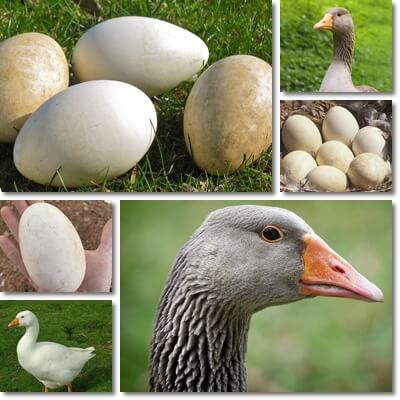Are goose eggs good to eat? What makes goose eggs healthy? Goose eggs provide wonderful nutrition as they are high in essential nutrients such as B vitamins, selenium, phosphorus, iron and protein with a diverse range of benefits for health. Benefits of eating goose eggs include better fertility and eyesight, anti-aging effects for the skin, wound repair, improved vitamin and mineral absorption, lower risks of cataract and benefits for the normal baby development during pregnancy.
What are the benefits of goose eggs?
1- High protein content
How much protein is in a goose egg? Goose eggs have 13.87 grams of protein per 100 g, and almost 20 grams of protein per egg (average weight of one goose egg: 144 g). To compare, the average adult needs 50 grams of protein everyday, and one goose eggs provides about 40% of daily protein requirements. Protein is an essential macro nutrient with benefits for tissue growth such as muscle growth, tissue repair and wound healing, and to produce antibodies for the immune system, hormones for the endocrine system and neurotransmitters for the nervous system.

2- Source of complete protein
Goose eggs are a source of complete protein. That is, the protein in goose eggs contains all nine essential amino acids the body needs every day, but cannot produce itself. Amino acids in goose eggs have many benefits for health; they boost female and male fertility, regulate blood sugar levels, improve mood, regulate appetite and sleep, stimulate the production of human growth hormone and collagen for wound healing, and elastin and collagen for a more youthful skin.
3- Benefits derived from cholesterol
How much cholesterol in goose eggs? One whole goose egg at 144 grams has 1230 grams of cholesterol, which is a lot. To compare, the average adult should consume up to 300 mg of cholesterol per day. However, goose eggs are good for you when consumed reasonably and infrequently because their high cholesterol content aids in the synthesis of hormones for fertility, contributes to making and absorbing vitamin D which has benefits for the immune system, bones and digestive health, and protects the nervous system.

4- Help make and absorb vitamin D
Goose eggs are naturally high in cholesterol. Cholesterol is a type of animal fat found in animal foods such as goose eggs, duck eggs and other types of eggs, but also produced by humans in the liver. Cholesterol in goose eggs helps the body process vitamin D from sunlight into forms that are available for use. Cholesterol in goose eggs also helps the body absorb vitamin D from food, including from the eggs themselves.
5- One of the few foods that contain vitamin D
Vitamin D in foods is scarce. Few foods have vitamin D, and those that do have it, have it in relatively small amounts. For the most part, animal foods have the best content of vitamin D, goose eggs included. How much vitamin D in goose eggs? One goose egg has a content of vitamin D of 2.45 micrograms which is about 12% of the daily recommended intake of the vitamin for an average adult.
6- Help the body absorb vitamins A, E and K
In addition to vitamin D, goose eggs also help you better absorb vitamins A, E and K. Vitamins A, D, E and K are all fat soluble vitamins, meaning they dissolve in fat. Fat soluble vitamins rely on fat such as unsaturated and saturated fats and cholesterol to be absorbed optimally and be transported in the body.
7- Curb hunger and provide satiety
Eating goose eggs provides high amounts of fat and protein. Both fat and protein are satiating, helping curb hunger and keep you satiated and satisfied for hours after a meal. However, one goose egg has 266 calories, around 20 grams of protein and 19 grams of fat and should be consumed in moderation and not quite everyday.
8- Food for the brain
Goose eggs are a healthy food for the brain. High in fat and protein, they actively nourish the brain and provide it with important nutrients to operate optimally. The high content of fat in goose eggs (19 grams of fat per egg) helps build brain cell membranes and combats brain fog, supporting learning, memory and other cognitive functions. The essential amino acids in goose eggs protein help make neurotransmitters that regulate brain and nervous system activity.
9- Provide excellent nutrition
One of the most remarkable aspects of goose eggs nutrition is their dense nutritional value. One goose egg at 144 grams has 1230 milligrams of cholesterol which is over 4 times the recommended daily intake, 7.34 micrograms of vitamin B12 which is over 3 times the recommended daily intake, almost 20 grams of protein which is 40% of the daily recommended intake and 96.5% of all the selenium you need in a day. Discover more about goose eggs nutrition.
10- Help combat nerve cell demyelination and degenerative diseases
The high content of cholesterol and vitamin B12 in goose eggs is good for nervous system health. Cholesterol and vitamin B12 help physically build the insulating coating surrounding the tail of of nerve cells, called the myelin sheath. Insulation of nerve cells is vital for conducting electrical impulses correctly and efficiently between nerve cells, helping the brain and body communicate. Loss of the myelin sheath is called demyelination and has been observed in degenerative diseases of the nervous system such as multiple sclerosis.
11- Combat fatigue and boost energy levels
Eating goose eggs is good for tiredness, fatigue and muscle weakness caused by anemia. Goose eggs are naturally high in iron and B vitamins such as vitamin B6 and vitamin B12. Iron and vitamins B6.B9 and B12 in goose eggs are involved in the production of red blood cells and hemoglobin which transport oxygen to tissues, boost energy levels and restore vitality. B vitamins are also involved in energy metabolism and actively combat fatigue and anemia, elevating energy levels.
12- High in iron and B vitamins
Goose eggs are naturally high in iron and B vitamins. One goose egg has an iron content of 5.24 mg representing 29% of the entire daily recommended intake of the mineral. One goose eggs also provides 20% of the recommended daily intake of vitamin B6, 27% of the recommended daily intake of vitamin B9 and over 300% of the recommended daily intake of vitamin B12.
13- Good for bones and teeth
Goose eggs are naturally high in phosphorus which regulates the processes of bone absorption and bone creation, helping build strong bones and teeth. Vitamin D in goose eggs further regulates endocrine processes that contribute to bone formation and calcium absorption into bones. Cholesterol in turn optimizes vitamin D absorption from food and vitamin D synthesis from exposure to sunlight.
14- Good for thyroid health
Goose eggs are naturally high in selenium which regulates thyroid activity and iodine metabolism for thyroid health. One goose egg at 144 grams provides 96.5% of all the selenium you need in a day. According to the new dietary guidelines, the average adult needs 55 micrograms of selenium every day, and one goose egg has 53.1 micrograms of the mineral. Phosphorus in goose eggs further contributes to thyroid health.
15- Build and repair muscle
The high content of protein in goose eggs recommends them for building muscle and repairing muscle damage. Amino acids in protein act like building blocks and help form new muscle fibers, as well as reduce muscle soreness and repair damaged muscle. How much protein is in a goose egg? Close to 20 grams of protein per one goose egg with an estimated weight of 144 grams.
16- Minor benefits for high blood pressure
Did you know goose eggs are good for high blood pressure? Eating goose eggs can help lower blood pressure numbers thanks to a good content content of dietary potassium. One goose egg provides over 6% of your daily potassium requirements.
17- Good for vision
Goose eggs have a good content of preformed vitamin A in the form of retinol with benefits for eyesight. Vitamin A is good for visual acuity, color vision and vision in low light. All of the vitamin A in goose eggs is in the yolk.
18- Goose eggs lower risks of cataract and AMD
Goose eggs have lutein and zeaxanthin, two pigmented yellow antioxidants that get absorbed in the retina and macula lutea area of the eyes. Lutein and zeaxanthin physically protect the eyes from damage from light, and can help lower risks of cataract (source 1, source 2). Moreover, lutein and zeaxanthin in goose eggs can both reduce risks and stop the progression of age-related macular degeneration (AMD) that causes loss of vision (source).
19- Anti-aging benefits for skin
Did you know goose eggs have anti-aging benefits for the skin? For one, the amino acids in goose egg protein help produce collagen and elastin, two structural proteins needed for skin elasticity. Preformed vitamin A in goose egg yolk, in the form of retinol, further exerts antioxidant, regenerative and reparative effects at the level of skin cells, with anti-aging benefits.
20- Benefits for fertility
Eating goose eggs is good for fertility in many ways. For one, the high content of fat in goose eggs, particularly cholesterol, helps synthesize hormones for both female and male fertility. Women also benefit from the good content of vitamin D in goose eggs – studies have found the uterus and ovaries have receptors for vitamin D, and a vitamin D deficiency can reduce fertility and conception rates. Zinc in goose eggs is good for fertility in men, while the excellent content of selenium regulates thyroid activity with direct benefits for endocrine health and fertility.
21- Good food for pregnant women
Goose eggs nutrition is a source of many benefits for pregnant women. Goose eggs have a high content of folate (vitamin B9) which research shows is good for the normal development of the baby during pregnancy, helping lower risks of defects of the brain, spine and spinal cord known as neural tube defects. High in vitamin B12 and other B vitamins, goose eggs support the expanding circulatory system of pregnant women, help make red blood cells to combat fatigue, boost vitality and exert an energizing action.
22- Promote hair health
Rich in B vitamins and protein, both essential and non-essential amino acids, fats and minerals with a regulatory effect on the endocrine system, goose egg provide good nutrition for strong and healthy hair.
23- Benefits for the immune system
What makes goose eggs good to eat for immunity? For one, goose eggs are high-protein and protein is needed to build immune system cells such as antibodies. Goose eggs further have a good content of vitamin D with an immunomodulatory action, and contribute to the immune system response. Vitamin A in the egg yolk activates skin cell regeneration processes for wound healing and protects the integrity of mucous membranes against infection.
